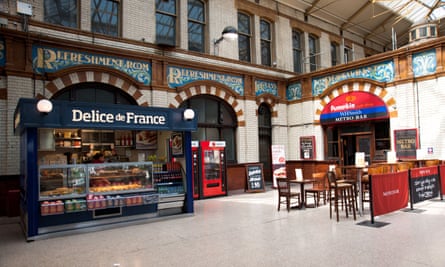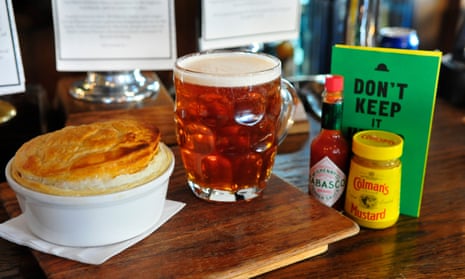By now, you will have read your fill of 2016 food predictions. Be it melon juice becoming a “thing” over at the Daily Mirror or analysts the Food People taking a bold punt on the influence of Filipino food, there is no shortage of opinions out there.
The London Evening Standard has, variously, tipped female chefs, restaurants that offer entertainment and Camden (the place, not an exotic new ingredient), to set the agenda this year. If William Hill offers odds on such things, however, stick your tenner on kombucha (a fizzy, fermented tea drink) and seaweed (as a seasoning, side dish or dried snack). There is such a consensus around those two that they feel like a self-fulfilling prophecy.
Fun as this all this is, though, there is a danger that in that concentrating on the future, we neglect the many basic improvements yet to be made to British food. In a conversation dominated by micro-trends (will gruit be the big beer style in 2016?) and obscure ingredients that may never make an impact outside a handful of east London restaurants, it is easy to forget that in Everyday UK, food is improving haphazardly and sluggishly. Which, frankly, is a far more pressing concern than the rise of the plango.
Instead of predictions, therefore, I would like to present a wish list. A listicle of things that could and should have been addressed before now, and that could be rectified in 2016. We live in hope …
Subject to severe delays

Two years ago, there was brief surge of optimism that Network Rail and the train-operating companies would shake up the dreary food at Britain’s railway stations. Since then? Progress has been painfully slow. Take the new Manchester Victoria, which (unless you catch the fantastic Companio Bakery, Tuesdays, 4pm-6pm) is, despite its recent £44m upgrade, as bad as ever. For example, this beautiful Victorian station’s bar was ripe for a Sheffield Tap-style makeover. Instead, the Beerhouse opened, a faux-craft operation owned by SSP, the global behemoth behind bog-standard brands such as Pumpkin and Upper Crust.
Cheesed off
Call me a dreamer, but robotically serving a brie, cheddar and blue with a few grapes and bought-in crackers is not the wingding end to a meal I expect when paying £6-£10 for a cheeseboard. Moreover, chefs: this neglected course can be jazzed up (homemade chutneys and fruit breads etc) with minimal effort. Do it.
A mine of misinformation
Diners have been complaining about restaurant websites for as long as the internet has existed, and with good reason. Many are still terrible (out of date, lacking basic essential details), and the migration of venues to Twitter, Facebook and Instagram has only made it worse. Hey, restaurateurs! We don’t want to spend an hour trawling through your old posts and tweets to find your opening times.
Pie in the sky
For a moment in 2014, it seemed as though a movement was building against that most egregious of modern pub dishes, the pie-not-pie (otherwise known as a casserole with a puff-pastry lid). But, looking at this archived petition, that energy appears to have petered out. Are we quietly boycotting these imposters? Or have we meekly acquiesced? Britain, you get the pies you deserve.
A bar to success
There are many reasons why Britain’s pubs are being squeezed (29 still shut every week), but the lack of well-trained bar staff cannot be helping. It seems there are now no bar staff working in the UK under the age of 45 who know a) how to make a bloody mary, b) what a brandy glass is, or c) how to manage a scrum at the bar. The new wave of this demoralising service is the cocky mixologist who – more interested in making like Tom Cruise in Cocktail than selling craft beer – fires a load of half-arsed info at you about the ales on sale, before extravagantly pouring and rolling your bottled-conditioned beer like a hefeweizen. The idiot. It is incumbent on bar managers to stop this rot.
One-man band
A shrinking number of readers may be old enough to recall a time when often talented chefs ran small, idiosyncratic restaurants, cooking there every service (I know, crazy, right?), without ever thinking about building empires or TV careers. That is not the only restaurant model. But if you care about truly remarkable food rather than scaleable “concepts”, it is one that must be revived.
You’ve had your chips
A growing number of fish‘n’chip shops are modernising their menus (sustainable fish fried to order, seasonal potatoes, homemade tartare sauce), but they remain a scattered band of evangelicals. I spend a lot of time scouring Britain for great cheap places to eat for this Guardian series and, in most city centres, next-level chippies are vanishingly rare. It is a tragedy for what you could argue is our national dish. But is it our fault? The idea persists that fish‘n’chips should never cost more than a fiver but, if we want to eat this dish at its very best, we need to cough up a few quid more.
Take the queue
Many of us were initially seduced by the idea of no-booking restaurants (it’s hip, it’s casual, it should keep prices down), but the sense that this trend is now in retreat is welcome. Ultimately, no one wants to schlep across town to queue in the rain and not get fed. Unpredictability is not a factor people appreciate in restaurants, and if popular places get booked up yonks in advance, so be it. In Leeds, The Man Behind the Curtain is full at weekends for the next year or so, but at least I know I can’t eat there.
New worldview

One of the most amazing things about eating in Britain is how varied the food is. The average British high street offers a panoply of international options. Yet our attitude to these imports is skittish. London, particularly, churns through fashionable dishes – from bánh mì to bao buns, ramen to hoppers – in a way that treats them as novelties. Where are the people delving in earnest into the many foreign cuisines available in the UK? Where is the proper foodie-media scrutiny of the flourishing immigrant food scene? Do you know where to get the best Polish food in the UK? No, me neither.
Bread of heaven
Given it is a near £8bn-a-year industry, there is no doubt that Britain loves a sandwich. Why, then, do our best independent sandwich shops (we need more of these, too), close around 4pm, ceding the after-dark scene to Tesco Express and Subway? We talk about street food in the UK, about fast, casual, on-the-go fodder and what will or won’t work. The answer is staring us in the face: the sandwich, a product that hot or cold, healthy or indulgent, neat or sloppy can be anything you want it to be, and works at any time of the day. I would love to see more sandwich shops open late.
So, as we head into 2016, how would you like to see UK food improve?

Comments (…)
Sign in or create your Guardian account to join the discussion